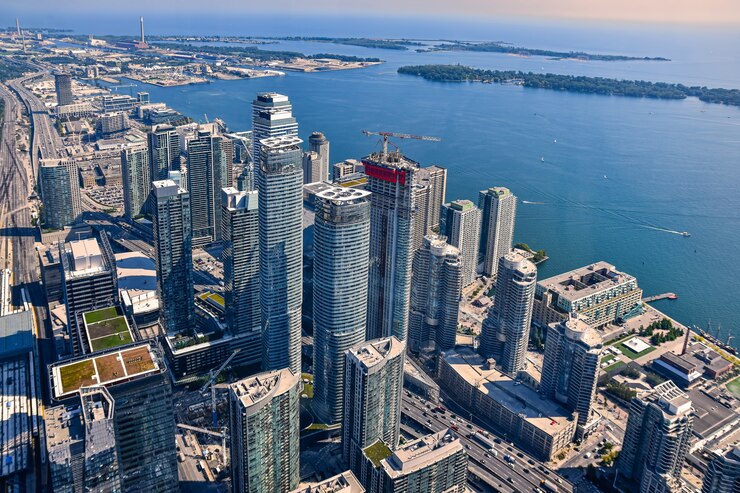Toronto Municipal Land Transfer Tax

The toronto municipal land transfer tax is an essential consideration for anyone involved in property transactions within the city’s boundaries. It stands as a significant financial obligation that accompanies the change of property ownership, directly impacting both buyers and sellers.
This levy mirrors the provincial land transfer tax but is specific to properties in Toronto, making it a unique feature of the local real estate market. For residents or investors in Canada’s largest city, grasping the nuances of the Toronto municipal land transfer tax could mean substantial savings or preparedness for expected costs associated with acquiring new property.
Contents
- 1 Overview of Land Transfer Taxes in Toronto
- 2 Eligibility for Toronto’s Land Transfer Tax Rebate
- 3 First-Time Home Buyer Rebates in Toronto
- 4 Payment Process for Toronto’s Land Transfer Tax
- 5 Historical Changes in Toronto’s Land Transfer Tax
- 6 Comparison with Other Major Canadian Cities’ Transfer Taxes
- 7 Additional Closing Costs in Toronto’s Real Estate Transactions
- 8 Conclusion
Overview of Land Transfer Taxes in Toronto
Land transfer taxes are crucial for real estate transactions. In Toronto, they apply whenever someone buys the property. This tax is a percentage of the property’s value. Buyers pay it directly to the municipality.
The municipal land transfer tax (MLTT) in Toronto serves as a significant revenue source. It helps fund city services and infrastructure projects. Without it, residents might face higher property taxes or service cuts.
Buyers should consider MLTT when budgeting for a home purchase in Toronto. It adds to the overall cost of acquiring property here.
Here’s how MLTT impacts buyers:
- Increases upfront costs;
- Varies based on property value;
- Applies only within Toronto boundaries.
Understanding this tax is critical when buying real estate in this city.
The importance of land transfer tax cannot be overstated for municipal finances. Revenue from MLTT supports public spending without burdening all taxpayers equally. Instead, it targets those participating in the real estate market at that moment.
This approach ensures that funds are available for maintaining and improving urban life quality without excessive pressure on existing residents’ wallets through increased general taxation.
For potential homeowners, however, this means an additional expense during an already costly process:
- Legal fees;
- Inspection costs;
- Moving expenses;
- Land transfer taxes.
All these contribute to the total cost associated with purchasing a home in Toronto’s competitive market landscape.
Eligibility for Toronto’s Land Transfer Tax Rebate
To receive the Toronto municipal land transfer tax rebate, specific criteria must be met. Firstly, the buyer must be at least 18 years old. They should also occupy the home as their principal residence within nine months of purchase. Buyers cannot have owned a home previously anywhere in the world if they are individuals. If purchasing with a spouse, neither can own a home while being married to each other.
The maximum rebate amounts available vary based on whether you are a first-time homebuyer or not. For eligible first-time buyers of residential properties, there is an opportunity to receive up to $4,475 in rebates on the municipal land transfer tax. This can significantly reduce closing costs and make homeownership more accessible.
Criteria for eligibility:
- Must be at least 18 years old;
- Occupy purchased property within nine months;
- No prior ownership of any residential property globally;
The process to apply for this tax rebate involves submitting necessary documentation during or after your property transaction closes. The application form is available through legal representatives handling your real estate purchase or directly from the City of Toronto’s website.
When applying post-closing, ensure that all documents are submitted within eighteen months following the registration date of conveyance or disposition event. It is crucial to keep records like agreements of purchase and sale handy as these may need accompanying applications.
Remember that this rebate only applies to the Toronto municipal land transfer tax and does not affect provincial obligations unless specified exemptions exist under Ontario regulations.
First-Time Home Buyer Rebates in Toronto
Toronto offers rebates to first-time home buyers to ease their initial financial burden. The city’s municipal land transfer tax includes a rebate program specifically for these buyers. This incentive can significantly reduce the upfront costs associated with purchasing a new home.
The rebates are designed to help first-time buyers enter the housing market. They apply only to those who have never owned a home before, anywhere in the world. If you’re buying with someone who has owned a home before, you may still qualify for part of the rebate as long as you haven’t personally been a homeowner.
To be eligible for these rebates, certain conditions must be met:
- You must be at least 18 years old;
- You cannot have previously owned a home or an interest in one;
- The property purchased must be used as your principal residence within nine months of purchase.
For single-family residences and other types of homes, this can mean substantial savings on closing costs. For example, if you purchase an average-priced house in Toronto, the municipal land transfer tax could amount to thousands of dollars, from which you might receive relief through this rebate. Documentation is key when claiming any rebate.
Payment Process for Toronto’s Land Transfer Tax
Upon completing a property transaction in Toronto, the Toronto municipal land transfer tax must be paid. The payment is due upon closing of the property purchase. This means that when you finalize your real estate deal, the tax should be settled concurrently.
Here are key points regarding the payment process:
- The deadline aligns with closing day, which is when ownership transfers;
- Buyers can pay through various methods, including electronic funds transfer or by cheque;
- If not paid on time, penalties and interest will accrue on the outstanding amount;
- It’s crucial to factor this cost into your overall budget for purchasing a property in Toronto.
Late payments result in additional charges that can add significantly to your expenses. To avoid these unnecessary costs, ensure prompt payment as part of your transaction completion.
De Krupe Law understands how complex dealing with taxes can be during property transactions. They offer thorough legal services. With their expertise, clients receive full support throughout their cases, handling every detail diligently.
They know that each client has unique needs and guarantee complete service provision without compromise. Their dedication ensures all aspects of the toronto municipal land transfer tax are managed effectively for their client’s benefit.
Historical Changes in Toronto’s Land Transfer Tax
The Toronto municipal land transfer tax has undergone significant changes since its inception. The evolution of this tax is marked by a series of adjustments that reflect the city’s economic landscape and housing market dynamics.
Initially, the land transfer tax rates were modest, and aimed at generating revenue without overly burdening property transactions. Over time, however, as Toronto grew and the demand for properties increased, so did the need for additional municipal funding. This led to periodic increases in land transfer tax rates. Each increase was often met with scrutiny from both buyers and real estate professionals who viewed it as an added expense to homeownership.
Significant legislative amendments have played a pivotal role in shaping the current taxation framework. The City Council, responsible for local governance and budgetary decisions, has enacted several vital changes affecting how property transactions are taxed within the municipality.
These amendments often align with broader provincial policies but also address specific needs within Toronto’s unique market. In 2008, when Toronto was granted authority by Ontario’s provincial government under the City of Toronto Act to implement its own version of a land transfer tax.
Subsequent alterations included adjustments to accommodate first-time homebuyers through rebates or exemptions.
These historical rate changes stem from various trends and reasons:
- Economic factors such as inflation;
- Housing market conditions;
- Fiscal requirements of running Canada’s largest city.
For instance, during periods of economic growth where property sales surged, higher taxes were justified by increased governmental expenditures on infrastructure and services needed to support expanding neighbourhoods.
Conversely, during slower markets or recessions where sales waned, or prices stagnated, there was pressure on officials not only to freeze hikes but sometimes even consider reductions or incentives to stimulate activity within the sector.
It is this delicate balance between fostering a healthy real estate environment while ensuring sufficient municipal revenue that continues to guide modifications in taxation policy over time.
The interplay between these factors underscores why understanding past legislative shifts offers insight into potential future directions for this essential fiscal tool used by Canada’s largest urban center.
Comparison with Other Major Canadian Cities’ Transfer Taxes
Toronto’s municipal land transfer tax often draws comparisons to transfer taxes in other major cities. Unlike Toronto, cities like Vancouver and Montreal have different structures for their transfer taxes.
For instance, Vancouver has a Property Transfer Tax that scales up based on the property’s fair market value. The first $200,000 is taxed at 1%, scaling up to 3% for amounts exceeding $2 million.
- Toronto — flat rates depending on property price brackets;
- Vancouver — progressive rates from 1% to 3%, higher thresholds;
- Montreal — a lower starting rate of 0.5%, topping out at 2.5%.
Montreal follows a similar incremental approach but starts with a lower rate of 0.5% for properties valued under $50,000. The rate increases progressively, with the highest bracket set at 2.5% for values over $1 million.
Rebate programs vary widely between these cities as well, affecting overall affordability and attractiveness to buyers. In Toronto, first-time homebuyers can receive an MLTT rebate up to a maximum of $4,475, which effectively waives the tax on homes purchased for less than this amount.
Vancouver offers exemptions under its Newly Built Home Exemption scheme aimed at encouraging purchases of newly constructed homes or condos.
With these variances in exemption thresholds or rebates across different municipalities come distinct impacts on buyer behaviour and housing markets within each city.
National context
Considering how Toronto’s land transfer tax aligns with national averages requires examining both provincial and municipal levels since some provinces do not impose additional municipal taxes like Toronto does.
Provincially speaking, Ontario’s land transfer tax is comparable in structure to British Columbia’s but tends toward higher rates as property values increase. However, it remains competitive when considering the combined burden of both provincial and municipal taxes compared against solely provincial levies elsewhere.
Additional Closing Costs in Toronto’s Real Estate Transactions
When purchasing a home in Toronto, closing costs beyond the municipal land transfer tax are critical to consider. These expenses can significantly affect your budget. Typical additional expenses include legal fees, which cover the services of a lawyer to review contracts and conduct a title search. Legal fees vary, but expect them to be at least one percent of the purchase price.
Homebuyers should also account for inspection fees. A professional inspection is essential for identifying potential issues with the property before finalizing the sale. Inspection costs depend on factors like the size and age of the home.
Other closing expenses involve title insurance, which protects against losses from defects in title, and adjustments for prepaid utilities or property taxes by the seller. Do not overlook these details, as they add up quickly.
On average, closing costs range between 1.5% to 4% of a home’s sale price in Toronto. For instance, purchasing a residential property priced at $500,000 could result in closing costs from $7,500 to $20,000, an amount not insignificant when budgeting for your new home.
To manage these additional expenditures effectively:
- Itemize each cost expected on closing day;
- Research average prices for legal and inspection services;
- Factor these into your overall budget early on.
Planning helps avoid surprises that could strain your finances during what should be an exciting time.
As you prepare for this financial commitment:
- Consult with real estate agents about typical fees associated with property purchases;
- Speak with lenders regarding mortgage-related charges such as application or appraisal fees;
- Remember that some properties may have specific requirements leading to unique additional thresholds or conditions impacting total expenses.
Given these variables, it’s wise to allocate extra funds within your budget just in case certain costs exceed initial estimates or unforeseen items arise close to your transaction date.
Conclusion
The intricacies of Toronto’s municipal land transfer tax are pivotal for anyone engaged in property transactions within the city. Understanding these components is essential to navigate the financial landscape of Toronto’s real estate market effectively.
Historical perspectives and comparisons with other Canadian cities underscore the unique position of Toronto’s tax system, while insights into additional closing costs offer a holistic view of property acquisition expenses.
Prospective buyers and sellers are encouraged to utilize this knowledge in planning their real estate endeavours. For further assistance or personalized advice on managing land transfer taxes and related costs, consulting with a qualified professional is recommended. Their expertise can help optimize your transaction strategy within Toronto’s dynamic property market.


